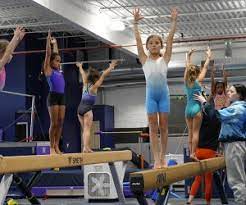Gymnastics for kids builds more than just strength and flexibility—it instils life-long values like teamwork, discipline, and focus. These traits extend beyond the gym floor, influencing how children approach school, friendships, and future responsibilities. When taught in a supportive environment, gymnastics becomes a powerful tool for character development, giving young athletes the structure they need to thrive.
Let’s explore how this sport teaches essential life skills in fun, practical ways, while laying the foundation for emotional and social growth.
How does gymnastics teach discipline to children?
Discipline is one of the first skills children pick up when they start gymnastics. From the moment they enter the gym, routines are structured and consistent—warm-ups, drills, cooldowns, and rules are all part of the process.
Through repeated practice, kids learn:
- How to follow instructions
- How to wait their turn
- How to manage frustration when skills don’t come easily
- The importance of punctuality and commitment
These habits transfer directly to school, home, and other sports. Children who commit to gymnastics sessions each week are actively building a mindset of consistency and self-mastery—both crucial traits in later life.
Discipline through goal setting
Gymnastics also teaches children how to set and work towards goals. Whether it’s perfecting a handstand or nailing a beam routine, gymnasts learn that progress takes time, patience, and perseverance. The incremental nature of training helps reinforce the idea that success is earned, not instant—an important contrast to today’s culture of instant gratification.
How does gymnastics promote teamwork despite being an individual sport?
While gymnastics may look like a solo endeavour, team interaction plays a huge role in the training process. Kids often work in groups during warm-ups and rotations, and they cheer each other on during routines.
Here’s how teamwork shows up in gymnastics classes:
- Group exercises teach rhythm, spatial awareness, and cooperation
- Children learn to encourage peers, not just compete with them
- Older or more experienced gymnasts may mentor younger ones
- Problem-solving together builds trust and communication
Many gymnastics clubs run team-based events or relays that require synchronisation and shared responsibility. These shared goals teach kids that collective effort is just as important as individual skill.
As Robert Cialdini’s principle of Liking shows, children are more likely to adopt behaviours when they feel connected to those around them. Gymnastics harnesses that social motivation by creating a culture of camaraderie and mutual respect.
What other life skills do kids gain from gymnastics?
Aside from teamwork and discipline, gymnastics offers a toolkit of everyday skills that kids carry into adulthood:
1. Focus and concentration
Each routine requires mental precision and attention to detail. Whether it’s counting steps or remembering choreography, gymnastics helps children train their minds to stay on task.
2. Resilience and coping with failure
Falling off the beam or missing a vault isn’t a loss—it’s a learning moment. Gymnastics builds emotional resilience by teaching kids to bounce back, adjust, and try again.
3. Body awareness and safety
From a young age, gymnasts become attuned to their posture, balance, and limits. This heightened awareness improves safety, coordination, and respect for one’s body.
4. Time management
Balancing gymnastics training with school and family commitments teaches kids how to manage their schedules. As they grow older, this becomes invaluable for juggling work, study, and social life.
Why do parents value gymnastics as a life skills activity?
Many parents turn to gymnastics because it offers more than physical benefits—it nurtures a well-rounded child. In an era where screen time dominates and attention spans are shrinking, gymnastics gives kids a reason to unplug, move, and engage with others face-to-face.
Moreover, gymnastics coaches often become positive role models, reinforcing respectful behaviour, responsibility, and sportsmanship. This kind of mentorship can have a lasting impact on how children view authority, effort, and collaboration.
Anecdotally, parents notice improvements in their kids’ confidence and independence after a term or two in gymnastics. Some children who start out shy or unmotivated begin to speak up, lead warm-ups, or help others.
Can gymnastics improve classroom performance?
Yes—skills from the gym often show up in the classroom. Discipline and focus gained during gymnastics sessions help kids pay better attention in school and stay on task with homework. Movement-based learning is also linked to better memory and cognitive development, particularly in younger children.
In fact, according to The Royal Children’s Hospital Melbourne, regular physical activity like gymnastics can support mental alertness, academic achievement, and emotional well-being.
FAQ: Gymnastics for Life Skills
What age is best to start gymnastics for life skills development?
Most children can begin gymnastics around ages 3–5, when their motor skills and attention span are ready. Early exposure helps reinforce positive habits before primary school.
How often should my child attend classes to see benefits?
Once or twice a week is usually enough to build routine, skill progression, and social familiarity. Consistency is more important than frequency.
Is gymnastics suitable for introverted or shy kids?
Absolutely. The structured environment and positive reinforcement from coaches can help shy kids open up and engage gradually at their own pace.
Final thoughts: Raising strong, capable kids—inside and out
Gymnastics for kids is about more than flips and handstands. It’s a dynamic, movement-based education that teaches focus, self-control, teamwork, and resilience. These qualities serve children well in every part of life—at school, at home, and later, at work.
If you’re looking to help your child develop in a positive, disciplined environment, it may be worth exploring kids gymnastics classes near you to get started.

